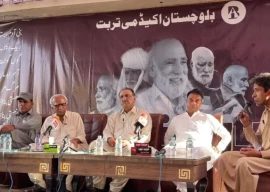
He spent 11 years in jail on what he says are trumped up political charges, benefitted from a controversial amnesty deal between his wife, former Prime Minister Benazir Bhutto, and Pakistan's military president Pervez Musharraf and landed in the president's office himself after Bhutto's 2007 assassination.
Since then, however, his government has constantly butted heads with the judiciary over old corruption charges, and on Oct. 13, Pakistan's Supreme Court will convene and possibly order the reopening of money-laundering cases in Switzerland despite his presidential immunity.
Here are some questions and answers about this critical moment in Pakistan's politics.
HAS ZARDARI BECOME A LIABILITY FOR THE PPP?
By most accounts, yes. He has never achieved the popularity of his late wife and has lived under a cloud of suspicion that he benefitted financially from her tenure as prime minister.
"The problem is he's not an asset for the party but if he's removed, there's no person on which the party will be able to agree. I don't see any obvious choice," said Ahmed Bilal Mehboob, executive director of the Pakistan Institute of Legislative Development and Transparency (PILDAT).
PPP officials, however, deny any political weakness and point to his continued tenure in office as proof of his popularity and ability to head the party.
"When workers feel their party under threat ... they will never go against the party but support it even if they don't like Zardari," said Hassan Askari Rizvi, a political analyst.
COULD HE BE REMOVED IF THE COURT MOVES AGAINST HIM?
Not easily. Pakistan's constitution provides for immunity from criminal prosecution for the president as head of state.
But the current dispute over the Swiss cases go back before he was in office, and it's possible the Supreme Court could interpret the immunity clause strictly and strip him of its protection.
Rizvi said the immunity clause is crystal clear, however, and re-interpreting it would be tantamount to "re-writing the constitution."
Party members and analysts agree that were the Supreme Court to begin moves to strip his immunity, Pakistan's powerful military would likely work behind the scenes to stave off a confrontation that could destablise the country.
"The establishment is not happy with Zardari but it will not go to the extent that the judiciary throws him out, because that means going too far," Rizvi said.
The army is currently in a position of strength after August's devastating floods, and there's no desire on the part of the brass for a military coup, a past response to government fecklessness. The army feels it's better to let the civilian government take the blame for the poor flood response, and then leverage that unpopularity for more internal influence.
The government "will do whatever the army wants, so that's why they don't want to knock him (Zardari) out, but to keep him under pressure," said Rizvi.
BUT WHAT HAPPENS IF HE IS FORCED OUT?
It could upend Pakistan's political system and give ammunition to the PPP's opponents -- including former prime minister Nawaz Sharif -- who have already made public their support for the judiciary in case of a confrontation.
There would likely be a no-confidence vote against the government of Prime Minister Yusuf Raza Gilani, forcing new elections that could propel Sharif back into the prime minister's seat.
Pakistan's allies and the United States believe any political crisis in nuclear-armed Pakistan would distract Islamabad's attention from its efforts to crush militants who are fighting an insurgency on the both sides of the border.
Washington has invested billions to build Pakistan's capacity to fight militants and carry out social sector development in Pakistan's lawless regions on the Afghan border in a bid to clear them of militancy.
Zardari's fall could jeopardise that investment.






1732427746-0/Copy-of-Untitled-(2)1732427746-0-270x192.webp)










COMMENTS (2)
Comments are moderated and generally will be posted if they are on-topic and not abusive.
For more information, please see our Comments FAQ